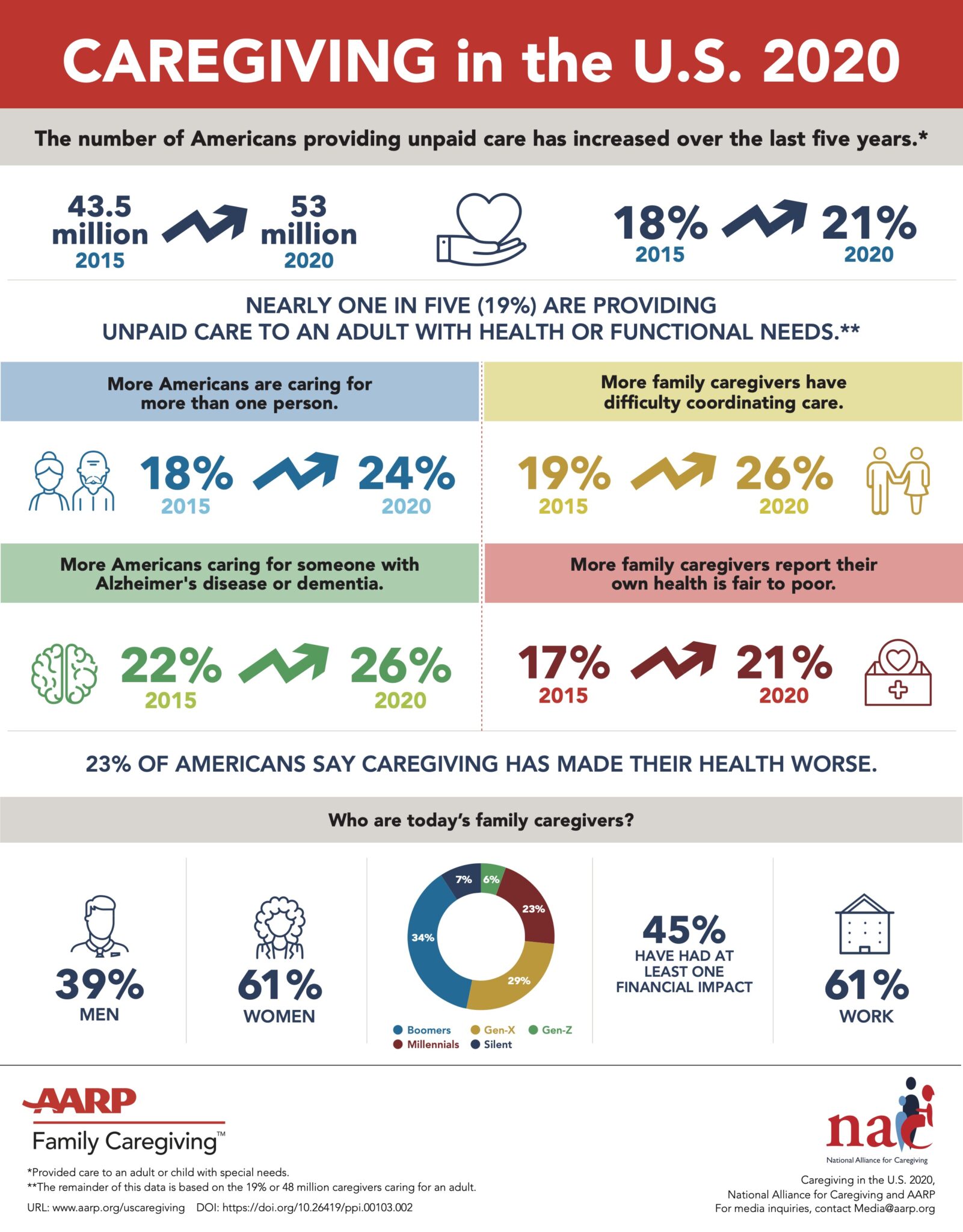Family caregivers are unsung heroes that make up a delicately crafted, largely invisible safety net of our society. They are among the most hidden and unappreciated workers caring for the incredibly vulnerable members in our communities, the disabled, the sick, and the aging. I’m so grateful for the research and data recently published by The National Alliance for Caregiving and AARP who teamed up to investigate the world of caregivers. The results of this study shed light on how grossly overburdened and pressed family caregivers are in terms of the amount of care needed by the care recipient, lack of adequate resources and reliable caregiving support services, and the consequential toll the stress is taking on the caregiver’s overall health.
The researchers conducted an online survey with 1,392 caregivers who were taking care of another person (either family or friend) who was 18 years old or older. In this study a caregiver was someone who was providing unpaid care to another adult identified by this question:
“At any time in the last 12 months, has anyone in your household provided unpaid care to a relative or friend 18 years or older to help them take care of themselves? This may include helping with personal needs or household chores. It might be managing a person’s finances, arranging for outside services, or visiting regularly to see how they are doing. This adult need not live with you.”
This study further explores the nuances of caregivers within the following subtypes: African American Caregiver, Asian Caregiver, Feeling Alone Caregiver, Gen X Caregiver, High Intensity Caregiver, Hispanic Caregiver, LGBTQ Caregiver, Millennial Caregiver, No Choice Caregiver, Rural Area Caregiver, and Student Caregiver. The research states, “Most caregivers of adults care for a relative (89 percent), typically a parent or parent-in-law (50 percent), spouse or partner (12 percent), grandparent or grandparent-in-law (8 percent), or adult child (6 percent), though 10 percent provide care to a friend or neighbor. Many caregivers live together with their recipient (40 percent).”
While this study was released in 2020, the data was collected between May 2019 - July 2019. I can’t even imagine how these findings would be different if they were to redo the study in May 2021, just two years later, and after the onset of the COVID19 pandemic. We have more people in need of higher levels of care, loss of or limited access to income and work, limited to no access to community or medical resources, and the loss of a basic sense of safety and security, among other shifts. Already strained caregivers have been pushed to the brink.
Caregivers have an endless supply of reasons to be burned out, overwhelmed, anxious and depressed. Quite frankly, I would be concerned if I met a caregiver who didn’t have some level of any one of these feelings. It’s a natural consequence of caring deeply about something. You can’t have love and joy without also experiencing, or becoming vulnerable to, pain and sadness.
In sharing this, I want to make several points to caregivers. The first point is that you are not alone. One in five American Adults find themselves tasked with being caregivers for another adult. These people are tucked away in homes usually only leaving for work or necessary errands or appointments. Second, I know you’ve been feeling tired, worn out and overwhelmed and probably blaming yourself for it. You are not having a hard time because you are doing something wrong. Caregiving is hard, often isolating work in which demand almost always exceeds capacity. Third, this research reflects how incredibly important it is for you to take initiative and responsibility for caring for yourself. Unfortunately, as a whole, our society does not properly care for you. We are making progress and slowly figuring it out but in the meantime you are the pioneer in this field teaching us how to care for you. Let this research validate your experience, shape your perspective on the challenges you are presented with, and enhance your overall self-compassion.
The work you do of caring for your loved one is so important and good. Take care of yourself so that you can continue to care for the ones you love without losing yourself.
Here is a link to the research cited in this post.
https://www.caregiving.org/caregiving-in-the-us-2020/
 |
Comments
Post a Comment